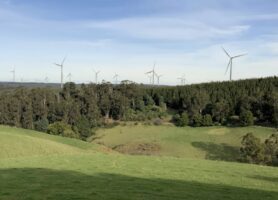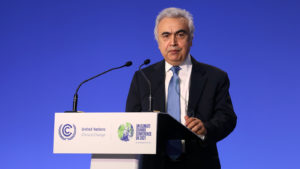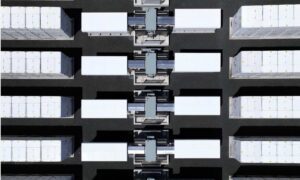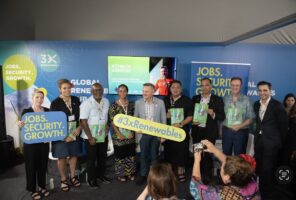The NSW Independent Planning Commission has blocked the proposed 102MW Crookwell Stage 3 wind farm, refusing to give planning consent to the project while citing concerns about visual impacts.
The decision to block the wind farm – located in the heart of energy minister and former anti-wind campaign Angus Taylor’s electorate of Hume – comes as the Berejiklian state government considers amendments to planning legislation that would protect coal mines from being blocked due to their contribution to global greenhouse gas emissions.
The Crookwell Stage 3 project would have seen the construction of 23 wind turbines in the NSW southern tablelands, 25km northwest of Goulburn, generating $120 million in investment and the creation of up to 40 jobs during the construction phase.
The project developers, Global Power Generation had previously responded to stakeholder concerns, downsizing the project from an initially planned 29 turbines, and had offered to further reduce the wind farm to as few as 17 turbines.
“The community raised a number of significant concerns about the visual impacts of the project on surrounding residences and the cumulative effect of wind farm projects with residences potentially able to view wind turbines in multiple viewing sectors,” the Commission said in a statement issued late Friday.
“The community expressed concern that wind farm projects will transform the landscape from an attractive rural landscape towards an industrial landscape dominated by wind turbines.”
While the commission noted that there would be public benefits generated by the project, including a reduction in reliance on fossil consumption, the commission said there were “significant residual issues” that led to the refusal of planning consent.

These outstanding issues related to the visual impacts of the wind farm, particularly on residences in the vicinity of the proposed project. The commission noted the consisting wind farms in the Crookwell region and decided that the cumulative visual impacts made an additional project unsuitable for the Crookwell Stage 3 site.
The Commission’s decision to block the project follows a referral from the NSW Department of Planning and Environment, which had likewise recommended the project be refused due to visual concerns in May.
Both the Department of Planning and the Independent Planning Commission had received numerous written submissions, both in support and in opposition to the project.
Local landholders have told RenewEconomy that the project presented an opportunity for farmers to receive supplementary income from the project, by hosting wind turbines on their properties, that would have provided much support at a time when New South Wales suffers through a period of prolonged drought.
As reported by RenewEconomy in July, opposition to the Crookwell Stage 3 wind farm had been led by Abbott-era business advisor Maurice Newman, who owns rural property in the Crookwell region, but is a permanent resident of Sydney.
The Australian Wind Alliance, which had been engaged with the project proponents and key stakeholders to understand the potential benefits of the wind farm, said that the outcome was disappointing, but remained optimistic about the prospects for wind generation across NSW.
“This is a disappointing decision. It shows the NSW regulations place undue weight on visual amenity at a time when wind farms can be contributing so much to farmers, local communities and clean energy generation,” Australian Wind Alliance’s national coordinator Andrew Bray said.
“It’s a bitter blow for those farmers coping with one of the worst droughts in recorded history who were hoping to find the security of drought-proof income from lease payments. The spin-off benefits for local workers, contractors and small businesses is huge from a project like this so for its refusal will disappoint many.”
“While this is a blow for Crookwell and the local community, we shouldn’t read too much into it in terms of wind development in the state. This is a closely settled rural area with a number of wind farms already which makes it unique in the state,” Bray added.
The decision to block the Crookwell 3 wind farm on the basis of the cumulative visual impacts of multiple wind farms located within the same region potentially raises questions over the viability of proposed renewable energy zones, that propose the co-location of projects to coordinate transmission and energy storage infrastructure.
Project developers Global Power Generation can appeal the decision in the NSW Land and Environment Court.
The Commission’s decision on the Crookwell 3 wind farm comes as the NSW Berejiklian government has announced a review into the Independent Planning Commission, and legislative amendments, following the decision of the commission to block the Bylong coal mine due to its contribution to global greenhouse gas emissions.
In September, the Commission made a decision to block the Bylong coal mine. Following that decision, the Berejiklian government was lobbied by the NSW Minerals Council, demanding that planning legislation be amended to prevent further coal mines being blocked on the basis of their contribution to global greenhouse gas emissions.
The commission’s decision to block the Bylong coal mine follows the landmark decision of the Chief Judge of the Land and Environment Court, Brian Preston, to deny planning approval for the Rocky Hill coal mine, citing the contributing the coal mine would make to global emissions as a relevant factor in opposing planning approval.
Under pressure from the Minerals Council, NSW planning minister Rob Stokes introduced amendments into the NSW Parliament that seek to prevent scope-3 emissions, the emissions produced by the burning of coal produced in NSW, being considered in planning decisions.
The move is expected to prevent the Independent Planning Commission, and the courts, from making further decisions to block the development of future coal mines due to their scope-3 emissions and on global warming concerns.
The move has been opposed by a collection of 47 experts, including Nobel prize winner Professor Peter Doherty and Professor Tim Flannery, who joined an open letter published by The Australia Institute, which said the expansion of coal mining in NSW was incompatible with the NSW Government’s goal to achieve zero net emissions by 2050.
“The NSW Government should strengthen planning rules to limit new coal mines whilst supporting regional communities to diversify their economies and seize new job opportunities in renewable energy and other industries,” the Australia Institute’s climate and energy program director Richie Merzian said.
“The impacts of climate change are made worse by emissions from coal mined in NSW. These mines add around 500 million tonnes of greenhouse gases to the atmosphere every year, almost as much as Australia’s entire domestic emissions.”







